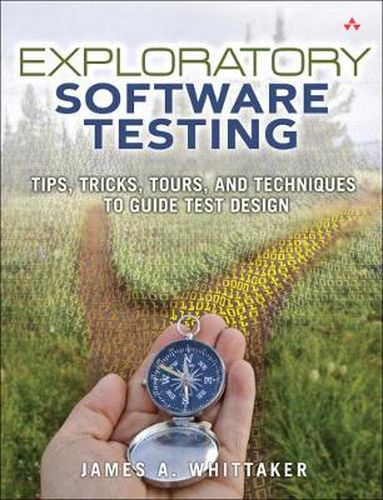Readings Newsletter
Become a Readings Member to make your shopping experience even easier.
Sign in or sign up for free!
You’re not far away from qualifying for FREE standard shipping within Australia
You’ve qualified for FREE standard shipping within Australia
The cart is loading…






How to Find and Fix the Killer Software Bugs that Evade Conventional Testing
In Exploratory Software Testing, renowned software testing expert James Whittaker reveals the real causes of today’s most serious, well-hidden software bugs–and introduces powerful new exploratory techniques for finding and correcting them.
Drawing on nearly two decades of experience working at the cutting edge of testing with Google, Microsoft, and other top software organizations, Whittaker introduces innovative new processes for manual testing that are repeatable, prescriptive, teachable, and extremely effective. Whittaker defines both in-the-small techniques for individual testers and in-the-large techniques to supercharge test teams. He also introduces a hybrid strategy for injecting exploratory concepts into traditional scripted testing. You’ll learn when to use each, and how to use them all successfully.
Concise, entertaining, and actionable, this book introduces robust techniques that have been used extensively by real testers on shipping software, illuminating their actual experiences with these techniques, and the results they’ve achieved. Writing for testers, QA specialists, developers, program managers, and architects alike, Whittaker answers crucial questions such as:
* Why do some bugs remain invisible to automated testing–and how can I uncover them?
* What techniques will help me consistently discover and eliminate show stopper bugs?
* How do I make manual testing more effective–and less boring and unpleasant?
* What’s the most effective high-level test strategy for each project?
* Which inputs should I test when I can’t test them all?
* Which test cases will provide the best feature coverage?
* How can I get better results by combining exploratory testing with traditional script or scenario-based testing?
* How do I reflect feedback from the development process, such as code changes?
$9.00 standard shipping within Australia
FREE standard shipping within Australia for orders over $100.00
Express & International shipping calculated at checkout
How to Find and Fix the Killer Software Bugs that Evade Conventional Testing
In Exploratory Software Testing, renowned software testing expert James Whittaker reveals the real causes of today’s most serious, well-hidden software bugs–and introduces powerful new exploratory techniques for finding and correcting them.
Drawing on nearly two decades of experience working at the cutting edge of testing with Google, Microsoft, and other top software organizations, Whittaker introduces innovative new processes for manual testing that are repeatable, prescriptive, teachable, and extremely effective. Whittaker defines both in-the-small techniques for individual testers and in-the-large techniques to supercharge test teams. He also introduces a hybrid strategy for injecting exploratory concepts into traditional scripted testing. You’ll learn when to use each, and how to use them all successfully.
Concise, entertaining, and actionable, this book introduces robust techniques that have been used extensively by real testers on shipping software, illuminating their actual experiences with these techniques, and the results they’ve achieved. Writing for testers, QA specialists, developers, program managers, and architects alike, Whittaker answers crucial questions such as:
* Why do some bugs remain invisible to automated testing–and how can I uncover them?
* What techniques will help me consistently discover and eliminate show stopper bugs?
* How do I make manual testing more effective–and less boring and unpleasant?
* What’s the most effective high-level test strategy for each project?
* Which inputs should I test when I can’t test them all?
* Which test cases will provide the best feature coverage?
* How can I get better results by combining exploratory testing with traditional script or scenario-based testing?
* How do I reflect feedback from the development process, such as code changes?